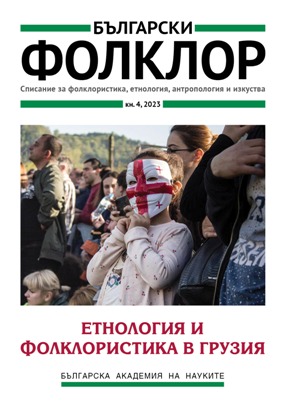Трансформация на образа на чинка във вярванията на съвременните грузинци (Според устни разкази и архивни текстове)
Transformation in the Image of the Imp in the Beliefs of Contemporary Georgians (According to Oral Narratives and Archival Texts)
Author(s): Marine TurashviliSubject(s): History, Anthropology, Social Sciences, Language and Literature Studies, Cultural history, Museology & Heritage Studies, Customs / Folklore, Library and Information Science, Archiving, Cataloguing, Classification, Preservation, Anthology, Studies of Literature, Sociology, Theology and Religion, Comparative Studies of Religion, Cultural Anthropology / Ethnology, Culture and social structure , Philology, Social Norms / Social Control, Theory of Literature, Identity of Collectives, Georgian literature, Psychology of Religion
Published by: Институт за етнология и фолклористика с Етнографски музей при БАН
Keywords: imp (chinka); mythology; oral history; memorative; fabulative; archival texts
Summary/Abstract: In the present article we examine mythological legends on imps, belonging to a specific genre of Georgian folk prose. They are new and have occupied their autonomous place in Georgian folklore since the 80s of the XIX century. During investigation we used the methods of secondary analysis and comparison. We used the texts of oral histories comparing them with published texts and with those kept in the Folklore Archive of Shota Rustaveli Institute of Georgian Literature. Oral histories are also recorded during our field-work in 2009 and kept as video materials in the mentioned archive. Unpublished archival materials contain the beliefs of the “low mythology” that have universal character. Mythological narratives on imps are based on real stories that are later transformed into unknowable events by folk imagination. In order to gain an understanding of this folk character, it is necessary to consider a number of key questions. These include: where do they try to meet people, how do they look – in terms of their appearance – when they are activated, how do they relocate, what is their function, what kind of relations do they have with human beings, and how can people get rid of them. In addition, it is important to consider the modern people’s attitude towards this character. Their habitation is proximate to that of humans, in narrow gorges, dark, abandoned and jinxed locales. They meet people in uninhabited places, attempting to intimidate them, but as the area becomes settled, they leave. In popular imagination, the imp is a diminutive malevolent spirit, resembling a man’s offspring. It may also take the form of a wild animal. They emerge from the second half of October to the middle of November, posing a significant threat to people, even causing madness. If a man knows how to get rid of a chinka, the chinka cannot cause harm; if not, a man will become ill for a long time or up to the end of his life. Imps are afraid of fire. If anybody threatens him with a firebrand, the imp immediately runs away. In modern language, the name of this mythological figure is used for the description of a quick, astute, nimble person. The investigation revealed that the imp of the third generation, an evil spirit, left a lasting impression on the population and continues to be a topic of interest to this day. The research demonstrated that texts on imps are accompanied by a narrator’s synoptic marking.
Journal: Български фолклор
- Issue Year: XLIX/2023
- Issue No: 4
- Page Range: 589-596
- Page Count: 8
- Language: Bulgarian
- Content File-PDF

